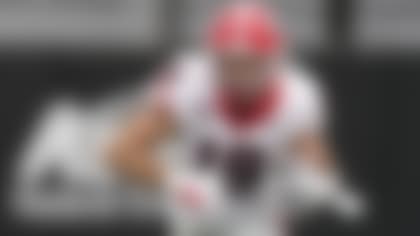
This is my breakdown of the top senior prospects available for the 2016 NFL Draft.
The players are divided into tiers of value: top 20, top 50, top 80, top 120, top 150 and top 200. Note that these are preliminary grades that will likely change based on player performance during the course of the 2015 season, as well as postseason all-star games, the NFL Scouting Combine and pro-day workouts. Some prospect ratings have changed since their initial publication due to continued study of their play as well as the evaluation of others at their position.
Caleb Azubike, OLB/DE, Vanderbilt
Azubike (pronounced az-ZOO-bah-KAY) has started just seven games for the Commodores, but he has 12 career sacks and his potential is as great as a night in downtown Nashville. He was born in Nigeria and moved from England as a youth, so he's relatively inexperienced. I'll bank on him stepping up his game using his powerful 6-foot-4, 270-pound frame as a senior.
Quinton Bradley, DE/OLB, Idaho
Bradley started to come on in his first year as a full-time starter in 2014, earning honorable mention All-Sun Belt honors (9.5 tackles for loss, six sacks). NFL scouts will likely see him as a strong 3-4 Sam 'backer candidate because of his size (6-3, 252), toughness, and agility on the edge.
Taveze Calhoun, CB, Mississippi State
Calhoun will combine with top-50 prospect Will Redmond to form one of the top corner duos in the country in 2015 -- if he can return from offseason ankle surgery. Already a two-year starter (four interceptions in 2013-2014) and college graduate, Calhoun (6-1, 180) will earn higher grades from scouts if he proves healthy enough to stay with receivers.
Michael Caputo, SS, Wisconsin
This Junior ROTC member garnered second-team All-American honors in 2014 from the Football Writers Association of America after leading the team with 106 tackles and coming up big in big games: He racked up 15 stops against LSU in the season opener, and he made seven stops while breaking up two passes in the team's upset win over Auburn in the Outback Bowl. Caputo has good size (6-1, 212) and toughness, and if he impresses with his athleticism at the NFL Scouting Combine, he should be an easy mid-round pick as a return-coverage star with the potential to contribute on defense.
Tra Carson, RB, Texas A&M
Carson is a 6-foot, 240-pound load with just enough speed to make linebackers regret leaving a gap for him to run through. The transfer from Oregon (after only one season) started just four games but led the team with 581 rushing yards last season. His Offensive MVP performance in the AutoZone Liberty Bowl (133 yards) portends a strong senior campaign.
Kyle Carter, TE, Penn State
Carter's numbers in the past two seasons combined (34 catches, 375 yards, two touchdowns) haven't matched those he put up as a redshirt freshman in 2012 (36-453-2). Still, he is a skilled tight end/H-back who is also willing to use his body as a blocker on the move and in-line. If Carter (6-3, 240) can connect with junior quarterback Christian Hackenberg more often as a senior and shows off his athleticism to scouts after the season, they'll consider him more than a move-the-chains passing-game option.
Brad Craddock, K, Maryland
Sure, no team has used a pick in the top three rounds on a kicker since 2005 ... but three of the last four kickers picked that high have come from a Big Ten school, so it wouldn't be a surprise if Craddock (6-0, 189) joined that club. Don't forget that kickers score about one-third of their teams' points during a course of a season, and they will become even more important to their teams with the extra point moved back to the 15 yard-line. The native Australian won the Lou Groza Award last year after hitting 18 of 19 field goal attempts, including a 57-yarder and a game-winner against Penn State. Another year like that (which is no guarantee given the challenges of the position) could land him in the third round.
Adam Gotsis, DE, Georgia Tech
Though he spent more time playing Australian rules football than American football growing up in Melbourne, Gotsis was a quick learner. He starred for a local club team before heading to Atlanta, and then played well as a true freshman against ACC competition. The 2014 consensus second-team All-ACC pick is still raw, and plays out of position as an interior lineman for Tech's defense considering his lack of bulk (6-5, 282). He possesses the quickness and motor to succeed as an NFL five-technique, however, and he'll continue to learn the game while filling out his frame in a professional strength and conditioning program.
Deiondre' Hall, CB, Northern Iowa
Hall's head coach, Mark Farley, has stated that Hall could play any position on defense because of his good attitude, football intelligence, and tenacious nature. He started at safety as a freshman, played as a lean rover (6-2, 190) at times his sophomore year, and then moved to the outside later that year before starring at the position in 2014 (racking up 74 tackles and five picks). Hall projects best as a press-man defender in the NFL, and his experience on special-teams-coverage units and as a kick returner will also benefit his draft status.
Keon Hatcher, WR, Arkansas
Things haven't always been easy for Hatcher during his time in Fayetteville, as his inconsistent hands have caused heartburn for coaches and fans on occasion. But when he's able to concentrate on the easier catches as well as he does on the more difficult ones, opponents must pay close attention to him on every play due to his combination of size (6-2, 210) and speed. Hatcher led the run-first Arkansas squad with 558 yards and six touchdowns receiving in 2014, and will probably put up similar numbers this year with two 1,000-yard rushers on the roster (Alex Collins, Jonathan Williams). Gaudy numbers are less important to NFL teams than athleticism and producing when given the chance; Hatcher could climb up boards if he's able to display both over the next year.
Kevin Hogan, QB, Stanford
Following Andrew Luck is not a fate I'd wish on anyone. But Hogan's handled it well, even if the Stanford faithful aren't pleased with his inconsistent accuracy after being spoiled by Luck the previous three years. Hogan certainly looks the part (6-4, 225), has won a lot of games (24-8 as a starter), and possesses the athleticism to be effective running the zone read at that size. His downfield accuracy is only average, as is his arm strength. However, there's no reason to think he can't land at least a fifth-round spot with some improvements in his senior season.
Devon Johnson, RB, Marshall
It's not tough to see why "Rockhead" earned that moniker -- no one wants to get in the way of this 6-1, 243-pound freight train. The first-team All-Conference USA pick accumulated 1,767 yards and 17 touchdowns rushing as a junior after lining up for two years as a tight end. If Johnson can prove he's as quick and agile as 2014 second-round big backs Carlos Hyde and Jeremy Hill, who both had success as rookies, then teams looking for a power back could take the leap in the top half of the draft. His receiving skills (12 catches, 218 yards, two scores in 2013) also give him a chance to take on an H-back role.
Orion Jones, DT, Toledo
Jones came into his own as a junior, garnering second-team All-MAC honors with 10 tackles for loss and six sacks for the Rockets. His motor, quick feet, and explosive hands help him overcome his lack of size (6-2, 285) inside. If he gets up to 300 pounds at the NFL Scouting Combine and teams believe he can maintain that weight, don't be surprised if he shoots up boards as a 3-4 end or one-gap 4-3 tackle.
Nila Kasitati, G, Oklahoma
Samaje Perine set a FBS record with 427 yards rushing against Kansas last season; it's no surprise that he followed Kasitati's (pronounced kah-sih-TAH-tee) blocks on several long runs. The big man (6-4, 315) pulled around the left side from his right guard position to cut off inside defenders, drove his man off the ball, or used his feet to seal the hole for Perine to bull through. Kasitati performed just as well in several other contests last year, showing footwork and agility belying his size. If his medicals check out at the Combine (he had surgery on a heart arrhythmia in the summer of 2012), he could earn top-100 grades.
Jordan Lucas, CB/S, Penn State
The Nittany Lions have not had a defensive back picked in the first three rounds since 2004 (Rich Gardner). Lucas has the ability to break that streak, however, because of his tenacious man-cover skills. He is physical enough to move to safety (58 tackles, four for loss, two sacks along with nine passes defensed in 2014) and could be a nice option in the slot for teams looking to regularly bring pressure from that area. Versatility is crucial in today's NFL, and Lucas has plenty to spare.
Wayne Lyons, CB/S, Michigan
Lyons, a cousin of former NFL receiver Frank Sanders, is transferring from Stanford to Michigan to play for Jim Harbaugh (who left for the San Francisco 49ers before Lyons arrived in Palo Alto.) As a graduate transfer, Lyons doesn't have to sit out a year -- which means NFL teams won't need to wait to see his combination of height (6-1, 193), length and tenacity in action.
Corey Marshall, DT/DE, Virginia Tech
Marshall redshirted in 2013 after taking time away from the team for personal teams early in the year -- and opponents wished he would have stayed away for the 2014 season as well (9.5 tackles for loss, 2.5 sacks). The second-team All-ACC pick (league coaches) has marginal size (6-2, 262) right now, but should be able to add weight to play five-technique/third-down nose to challenge offensive linemen with his hustle, quick feet, and strong hands.
Tyriq McCord, OLB, Miami (Fla.)
McCord's stats don't scream top-100 pick (6.5 tackles for loss, three sacks in 2014), but the Hurricanes' depth in the front seven allows them to rotate players, spreading out the production. There's no questioning the Tampa native's athleticism on the edge, as he can close on ball carriers from behind. McCord also has good size (6-3, 236) and shows more interest in holding up the line against the run game than you'd expect for a rush specialist.
Mekale McKay, WR, Cincinnati
McKay, a former high school hoops star, transferred from Arkansas to be closer to an ailing grandmother. He has a 6-6, 195-pound frame that is easy to notice, and has averaged more than 20 yards a catch in his two years with the Bearcats after starting 10 games as a freshman in the SEC. Draftniks should also stick this note in their pocket: Any scout sitting down to watch McKay's tape will see another Bearcats wide receiver, Chris Moore, jumping off the screen. He doesn't have McKay's size (6-1, 190), but his explosiveness after the catch (18.1 yards per reception, 19 TDs in career) will put him on teams' radars.
David Mims II, CB, Texas State
Mims is a legacy pick (his father had a short career as a receiver for Atlanta) and has the movement and ball skills to join his backfield partner last year, Craig Mager, as a third-round pick. In his first year as a full-time starter, he nabbed five interceptions and broke up three other passes. With Mager in the NFL, Mims might not be challenged as often in 2015 -- but if he shuts down top receivers and makes plays when given the chance, he'll open scouts' eyes.
Drew Ott, DE, Iowa
The former Nebraska Gatorade High School Player of the Year is a productive strong-side end for the Hawkeyes who garnered second-team All-Big Ten honors from the media after leading his team in tackles for loss (12) and sacks (7.5). He has the size (6-4, 270) and agility to stay outside in a four-man NFL front, containing the edge vs. the run and hustling his way to the quarterback if the ball doesn't leave the pocket quickly.
Kevin Peterson, CB, Oklahoma State
While he's not the tallest corner in the draft class (5-11, 190), Peterson might be one of the toughest. He is a willing tackler against the run and fights through blocks to get to screen passes. In coverage, he generally maintains good position (two interceptions, 11 pass breakups in 2014) and is able to fight receivers for 50/50 balls down the field. His draft position will be determined by his timed speed, like many other cornerbacks, but no senior defender is more fearless than Peterson.
Pete Robertson, OLB, Texas Tech
Tech has not had a front-seven defender picked in the top three rounds since defensive end Montae Raegor was a second-round pick of Denver in 1999. Robertson should end that streak. He earned second-team All-Big 12 notice from league coaches last season with his 12-sack effort. His tall, long frame (6-3, 236) allows him to hold off tackles in order to contain the run, as well as bull-rush or beat them around the corner to chase the quarterback. Robertson chases plays downfield, as well, meaning he can be a factor on a play even if he's not reaching the passer. Scouts might consider him more of a hustle rusher than an elite prospect, but he should be a solid mid-round addition to a 3-4 defense.
Jamal Robinson, WR, Louisiana-Lafayette
Injuries limited Robinson in 2014, but scouts won't forget about his skills heading into this year. The 6-4, 205-pound receiver actually caught 15 balls and four touchdowns in three-plus games of action, following up a second-team All-Sun Belt season in 2013, when he averaged 16 yards a catch and scored eight times. Robinson uses his strength and strider's speed to win down the sideline, but has enough foot quickness to stutter-step and run the quick out to complement the deep ball. A healthy and consistent 2015 should shoot him up draft boards.
Jay Rome, TE, Georgia
Rome's career has not met expectations so far, as he's accumulated just 30 catches in three years with the Bulldogs. However, his NFL frame (6-6, 250) and athleticism are obvious, as he is a mismatch nightmare when he escapes down the seam, and he also has the short-area quickness to exploit second-level defenses. Given a healthy season and ample opportunities in the Bulldogs' run-heavy attack, Rome could become a heavily valued prospect by the end of the process.
Kevon Seymour, CB, USC
Entering his third year as a starter for the Trojans, Seymour (6-0, 185) pairs with super sophomore Adoree' Jackson to form one of the best duos in the country. He led USC with 13 pass breakups in 2014, and intercepted his second career pass as well. Considering that Seymour practices against some of the best receivers in the country, he should improve when it comes to creating turnovers and playing physically downfield.
Tajae Sharpe, WR, UMass
This tall, lean receiver (6-4, 200) presents problems for defenses as he works the middle of the field, gets open deep with long strides, and wins jump balls. The first-team All-MAC pick caught 85 passes for 1,281 yards and seven touchdowns in his junior year, continuing his streak of catching a pass in every game he's played for the Minutemen. Showing scouts he's fast enough to separate from NFL corners, and strong enough to battle them downfield, will result in mid-round grades.
Matt Skura, C, Duke
A third-team All-ACC selection by league media in 2014, Skura (6-4, 305) is a technically sound and athletic center with a bright NFL future. The two-year starter played some guard as a redshirt freshman, but his home is inside, where his intelligence can be fully utilized. Look for Skura's name to be more recognized nationally as head coach David Cutcliffe continues to raise the bar for the football program in Durham.
Nelson Spruce, WR, Colorado
One of the most productive receivers in college football in 2014, Spruce (6-1, 195) filled the stats sheet with 105 catches for nearly 1,200 yards and 12 scores. Former teammate Paul Richardson was picked in the second round by Seattle in 2014; Spruce might not be considered an explosive downfield threat like Richardson, but he fights for the ball in the air and is reliable -- two important traits for an NFL receiver. Another productive season should help him secure a third-round slot.
Jordan Swindle, OT, Kentucky
Swindle began truly filling out his 6-7, 307-pound frame going into his junior season and the resulting improvement in his game was clear to see. After three seasons as the starting right tackle (with one start at left tackle for the suspended Darrian Miller last season), Swindle moves to the left side; if he continues to fine-tune his footwork so he can employ his length and agility fully against SEC pass rushers, NFL teams will consider him a fine mid-round swing-tackle prospect.
Shadrach Thornton, RB, North Carolina State
Some scouts will probably view Thornton as too upright a runner to make it at the next level. But I'd ask them to remember another 6-foot back with an upright style who has carved out a nice NFL career: James Starks of the Green Bay Packers. Thornton (6-1, 218) has a nice burst through the line for his size and runs through tackles despite giving defenders a large target. He earned honorable mention All-ACC accolades last year with 908 yards and nine touchdowns in a platoon backfield, and should garner more honors in 2015 -- and possibly a third- or fourth-round draft slot.
Sebastian Tretola, G, Arkansas
The 6-5, 334-pound Tretola actually began his career at Nevada, redshirting one season and starting four games the next, before heading to Iowa Western Community College for the 2013 season. In his first year with the Razorbacks, he used a strong base and brute strength to pave the way for two 1,000-yard rushers in Alex Collins and Jonathan Williams. He won't be a fit for all NFL offenses, but those with power-based run schemes will find him intriguing.
Rob Trudo, G/C, Syracuse
A three-year starter at left guard for Syracuse, Trudo (6-4, 300) is sliding over to center and hoping for a healthy final collegiate season (he missed time last season and this spring with ankle and leg injuries). Scouts appreciate this move, as it will give him versatility along with the very good movement skills that he showed while pulling and getting downfield as a run blocker. He also possesses the intelligence (already a four-time academic all-conference pick, including his redshirt season) to excel in the middle of the line at the next level.
Arturo Uzdavinis, OT, Tulane
Flying under the radar a bit while starting the past two years at left tackle for a struggling Tulane program, Uzdavinis (6-7, 304) probably won't be on most college football fans' minds this year. However, come all-star game season, he'll impress scouts and draft followers alike with his size, agility and willingness to finish blocks. If he tests as well as I expect after the season, there's no reason he can't be a top-100 pick.
D.J. White, CB, Georgia Tech
White (5-11, 188) made one of the more impressive plays of the 2014 season when he used his speed to chase down Pitt's star running back, James Conner, on a 74-yard run to knock the ball out just before they reached the end zone. That sort of hustle combined with his ability to make plays in coverage (he had a team-best four interceptions and eight pass breakups last year) turned White into a honorable mention All-ACC selection as a junior -- and could possibly land him a mid-round draft spot next spring.
Jordan Williams, WR, Ball State
The Cardinals don't gain much national attention, but Williams' game should. He possesses a thick build (6-2, 224) that makes it difficult for smaller corners to press him at the line or fight for the ball downfield. Williams' speed is more than adequate to make plays downfield, and he tracks the ball very well down the sideline. The last MAC receiver picked in the second round was Greg Jennings, a two-time Pro Bowler for Green Bay during his stint there; it won't be a surprise if Williams has similar success in the right situation.
Follow College Football 24/7 on Twitter _@NFLCFB_.












